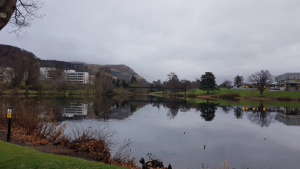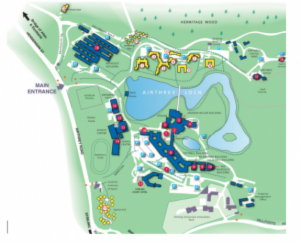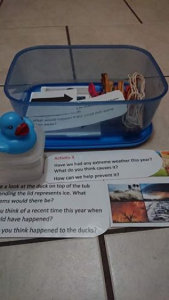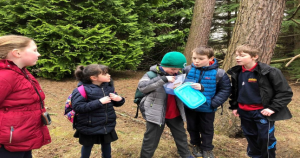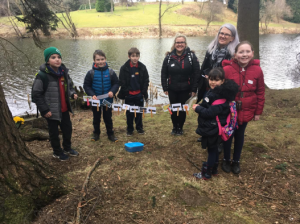We’ve got Snow Food
The geocache was located North of Airthrey Loch on the University of Stirling campus, as illustrated below. The aim of the outdoor activities in the cache was to encourage pupils to construct a food chain based on organisms specific to that habitat. This learning was then linked to sustainability and specifically climate change and its effect on organisms in an ecosystem.
*This geocache is temporary waymarked and will therefore not be available on geocaching.com
Learning Objectives
The purpose of this geocache was for pupils to use inquiry based learning to construct and understand how food chains work using a habitat on the University of Stirling campus. We chose this location due to it allowing the geocache activities to be place responsive. The pupils could use the environment around them to help prompt the decisions they made. Additionally, we looked at impacts on food chains and how external factors such as extreme weather can have an effect on the resulting food chain and the organisms within it. With the aid of visuals, the pupils then recalled recent weather events and discussed the impact climate change could have on our weather systems. Furthermore, how human impacts potentially lead to climate change resulting in extreme weather such as ‘The Beast From The East’.
Through this discussion the pupils were able to suggest ways in which they could be more sustainable in their day to day lives, they began to see the impacts humans have on the world around them. We specifically designed the activities to be pupil led with prompts to aid in their discussions.
Task One: Food Chain
The first activity involved the pupilsf constructing a food chain using pegs and string and organism cards. They worked together as a team to understand what each card represented and its position in the food chain. We then took away certain species and discussed what the effect would be on the other organism populations. We used open questioning to stimulate discussion around what happens when populations grow too large or near extinction in a given habitat.
Task Two: Impacts on the Food Chain
Task two followed on from our discussions surrounding the food chain. We placed a rubber duck on top of a plastic tub of water, using the lid to represent ice on the loch. The children were very quick to come up with ideas and suggestions for what this would mean for the ducks in terms of accessing their food source.
Task Three: Discussion of impacts on extreme weather and everyday living
The final activity progressed from looking at a hypothetical situation with the duck on top of the tub to when this would have happened in recent times. The children related this to the recent extreme weather and independently began a discussion regarding climate change and possible consequences of it. Then with the help of the supporting adults we further questioned and considered what possible causes of climate change are instigated by humans. To finish off the geocache activity the children suggested ways in which we make our day to day lives more environmentally sustainable, for example recycling.
Links to Curriculum for Excellence Experience & Outcomes
Early/First Level:
I can explore examples of food chains and show an appreciation of how animals and plants depend on each other for food. SCN 1-02a
Second Level:
I can discuss the environmental impact of human activity and suggest ways in which we can live in a more environmentally- responsible way. SOC 2-08a
The geocache is designed to be linked to one of the ten big ideas in science. We felt it linked best to; ‘8. Organisms require a supply of energy and materials for which they are often dependent on or in competition with other organisms’.
Holly Robertson & Laura Stansfield (3rd Year University of Stirling – Primary Education with Environmental Science), Yvonne Kewell (3rd Year University of Stirling – Heritage and Conservation)
This geocache was a temporary way-marked cache – it is not available on geocaching.com
Thanks to Mr Alan Atkinson and all the pupils from Deanston Primary School who came along to help us trial our geocache.
